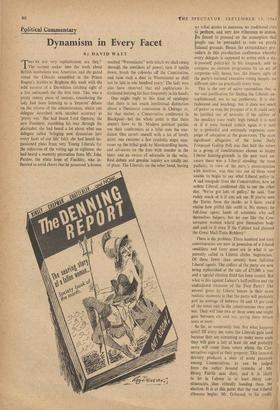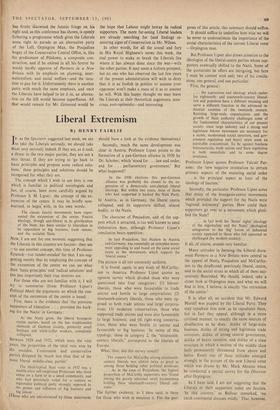PRlitical Commentary
Dynamism in Every Facet
By DAVID WATT TrTHEY'RE not very sophisticated, are they?' 1. The earnest seeker into the truth about British institutions was American, and she gazed round the Liberals assembled in the Prince Regent's Stables at Brighton this week with the wild surmise of a Darwinian catching sight of a live ccelocanth for the first time. This was a pretty snazzy piece of meiosis, considering the lady had been listening to a 'keynote' debate on the reform of the administration, which one delegate described with succinct accuracy as 'pretty wet.' She had heard Lord Ogmore, the new President, stumbling his way through the platitudes; she had heard a lot about what one delegate called 'bringing new dynamism into every facet of our life' (sic); she had heard im- passioned picas from very Young Liberals for the reduction of the voting age to eighteen; she had heard a masterly peroration from Mr. John Pardoe, the white hope of Finchley, who in- formed us amid cheers that hi possessed 'a broom marked "Westminster" with which we shall sweep through the corridors of power, turn it upside down, brush the cobwebs off the Constitution, and raise such a dust in Westminster as shall not be laid in one hundred years.' The lady may also have observed that old sophisticate Jo Grimond burying his face frequently in his hands, One might reply to this kind of catalogue that there is not much intellectual distinction about a Democrat convention in Chicago or, for that matter, a Conservative conference in Blackpool—but the whole point is that there doesn't have to be. Modern political parties use their conferences as a tribe uses the war- dance. One covers oneself with a lot of lovely paint, one executes a few symbolic steps, sum- mons up the tribal gods by bloodcurdling hoots, and advances on the foes with murder in the heart and an excess of adrenalin in the veins. Real debate and genuine inquiry are totally out of place. The Liberals, on the other hand, having no tribal deities to summon, no traditional rites to perform, and very few tribesmen to arouse, Ire forced to proceed on the assumption that reople can be persuaded to vote on purely ational grounds. Hence the extraordinary pro- cedure in this pre-election conference whereby'. every delegate is supposed to arrive with a do=: it-yourself policy-kit in his knapsack, and to compose an election programme by an act of corporate will; hence, too, the bizarre sight of the party's national executive voting happily on different sides on practically every issue.
This is the sort of naïve rationalism that is the real justification for finding the Liberals un- sophisticated, not to say prehistoric. It is old- fashioned and touching; but it does not• smelt of power or even the prospect of it. It could only be justified out of necessity if the calibre of the speakers were really high (which it 'is not) or if it were backed (which again it it not) by a powerful and extremely expensive cam- paign of education at the grass-roots. The most significant allegation of the' latest Dairy Telegraph Gallup Poll was that half the voters in a group of constituencies chosen as happy. Liberal hunting-grounds in the past were un- aware there was a Liberal standing; the most pathetic, in view of the party's preoccupation with doctrine, was that two out of three were unable to begin to say what Liberal policy is. A sad renegade from the Conservatives, now an ardent Liberal, confirmed this to me the other day. 'We've got lots of policy,' he said. 'Too ruddy much of it if you ask me. If you've seen the Tories from the inside, as I have, you'd realise how pitiful this outfit is. No money, no full-time agent, loads of amateurs who call themselves helpers, but no one like the Con- servative women who'd give themselves body and soul to it even if the Cabinet had planned the Great Mail-Train Robbery' There is the problem. Three hundred and sixty constituencies are now in posession of a Liberal candidate and forty more are in what is ap- parently called in Liberal circles 'negotiation.' Of these fewer than seventy have full-time Liberal agents. The coffers of the party are now being replenished at the rate of £75,000 a year and a special election fund has been started. But what is this against Labour's half-million and the undisclosed treasures of the Tory Party? The answer given by Liberal bosses in their more realistic moments is that the party will probably poll an average of between 10 and 15 per cent of the votes cast in the constituencies they con- test. They will lose two or three seats and might gain between six and ten, giving them fifteen seats at most.
So far, so moderately bad. But what happens next? Of every ten votes the Liberals gain (and because they are contesting so many more seats they will gain a lot) at least six and probably more will come from voters whom the Con- servatives regard as their property. This immoral thievery produces a state of acute paranoia among Conservatives, as can be judged from the rather fevered remarks of Mr. Henry. Fairlie next door, and it is likely, to let in Labour in at least thirty con- stituencies. thus virtually handing them the election. It is at this point that the real Liberal dilemma begins. Mr. Grimond, to his 'credit, has firmly disowned the lunatic fringe on his right and, as this conference has shown, is openly fathering a programme which gives the Liberals some right to parade as an alternative party of the Left. Orpington Man, the Poujadiste bogey of the Conservative Central Office, is, like his predecessor of Piltdown, a composite con- struction, and if he existed in all his horror he would hardly approve of Partners in a New Britain with its emphasis on planning, inter- nationalism, and social welfare—and the taxa- tion to pay for it. Unfortunately there is another party with much the same emphasis, and once the Liberals have helped to let it in, an alterna- tive on the left would become superfluous. All that would remain for Mr. Grimond would be the hope that Labour might betray its radical supporters. The more far-seeing Liberal leaders are already searching for (and finding) re- assuring signs of Conservatism in Mr. Wilson.
In other words, for all the sound and fury in His Royal Highness's mews this week, the real power to make or break the Liberals lies where it has always done since the war—with the other parties. It may seem a forlorn prospect, but no one who has observed the last few years of the present administration will wish to deny that it is as foolish in politics to assume your opponent won't make a mess of it as to assume he will. With this happy thought we may leave the Liberals at their theoretical arguments, tena- cious, ever-optimistic—and interesting.































 Previous page
Previous page